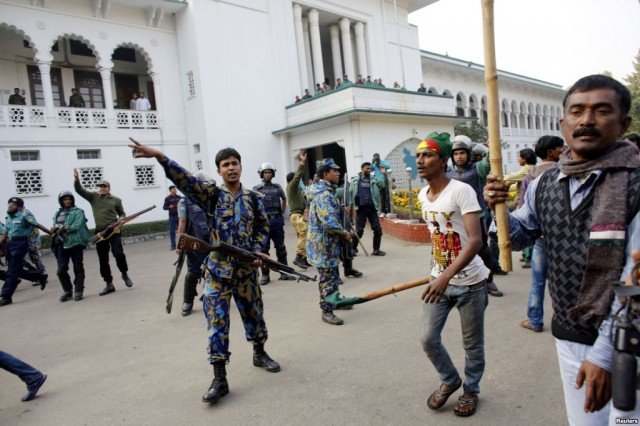Bangladeshi opposition activists and police clashed as the country is holding a general election boycotted by the opposition.
At least three people were killed in unrest on Sunday. Scores have died in the run-up to the polls.
Dozens of polling stations have been torched and voting is suspended at more than 100. Polling is said to be thin.
The opposition is boycotting the vote with a two-day strike against what it called a “scandalous farce”.
PM Sheikh Hasina’s Awami League is assured of victory, with government candidates already declared victors by default in many seats.
She rejected demands for her to step down and a neutral government to oversee the poll, as in previous years.
“The polls opened across the country at 08:00,” said election commission spokesman SM Asaduzzaman. Voting will continue until 16:00.
In more than half of constituencies there is no voting at all, because the opposition boycott has led to government candidates being declared winners in advance.
Police opened fire as protesters tried to take over polling station in northern Rangpur district, killing three people.
In Nilphamari district, police also fired on about two dozen protesters. One person died.

In the opposition stronghold of Bogra, the police chief told AFP: “We’ve seen thousands of protesters attack polling booths and our personnel at a number of locations with Molotov cocktails and petrol bombs.”
Media reported that more than 100 polling stations were torched overnight – adding to a similar number the night before.
One polling station in Dhaka’s Mirpur district recorded only 25 ballots out of 24,000 registered voters in the first two hours, AP reported.
Security is tight, with some 50,000 troops reportedly deployed around the country for the election.
Given the arson attacks and attempts to steal ballot papers and despite the heavy police presence, voters are wary about how secure they would be in coming to the polling stations.
The opposition Bangladesh National Party (BNP) began a nationwide 48-hour strike on Saturday a day after its leader Khaleda Zia urged supporters to “completely boycott” what she called a “scandalous farce” of an election.
She accused the government of placing her under house arrest – something the authorities deny.
The strike is only the latest in a string of protests by the BNP and its allies – including the Islamist Jamaat-e-Islami party – that has seen a blockade of roads, railways and waterways and the closure of shops, schools and offices.
In the run-up to the polls, scores of opposition supporters died in police shootings and dozens of commuters were burnt to death by protesters throwing petrol bombs at strike-defying buses.
All elections since 1991 have been held under a neutral caretaker administration to ensure that voting is not fixed.
But the Awami League abolished the caretaker system in 2010, arguing that it was no longer necessary. It used its two-thirds majority in parliament to make the change.
The government has insisted that the BNP should take part in the polls within the existing constitutional framework. It says that the opposition should discuss any changes it wants after the vote.
Sheikh Hasina and Khaleda Zia – who are bitter political enemies – have alternated from government to opposition for most of the past two decades.
[youtube vha_sYvlhjg 650]
